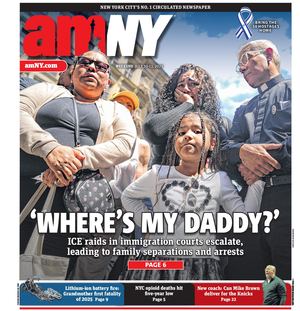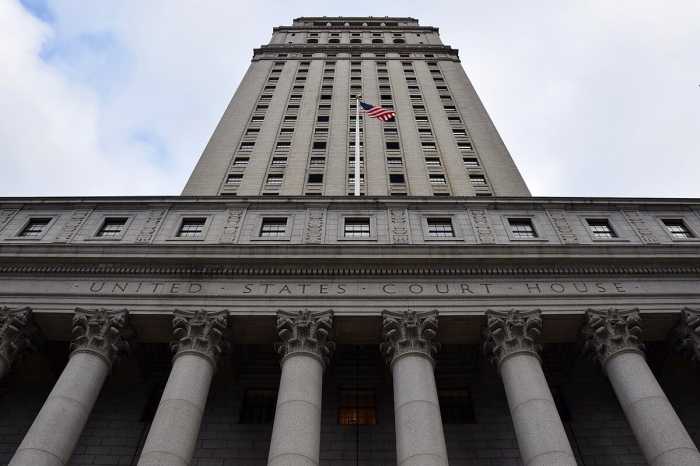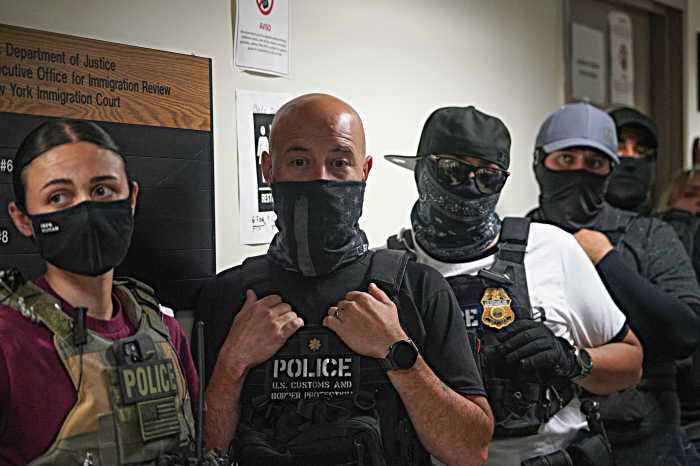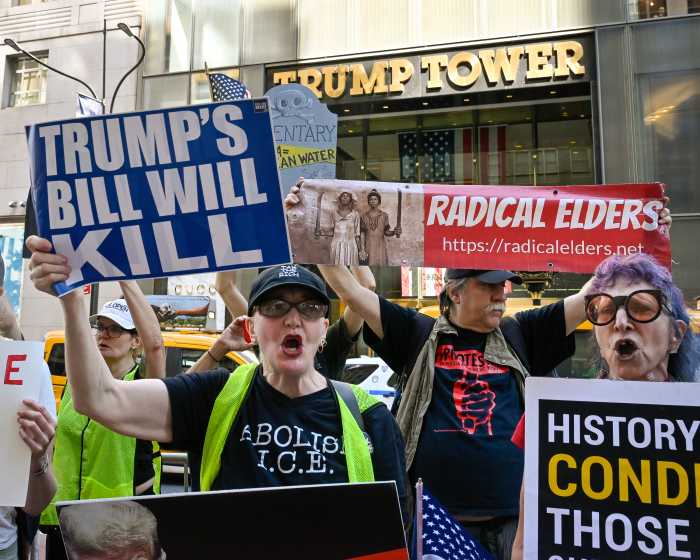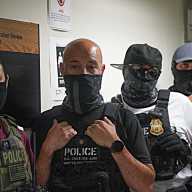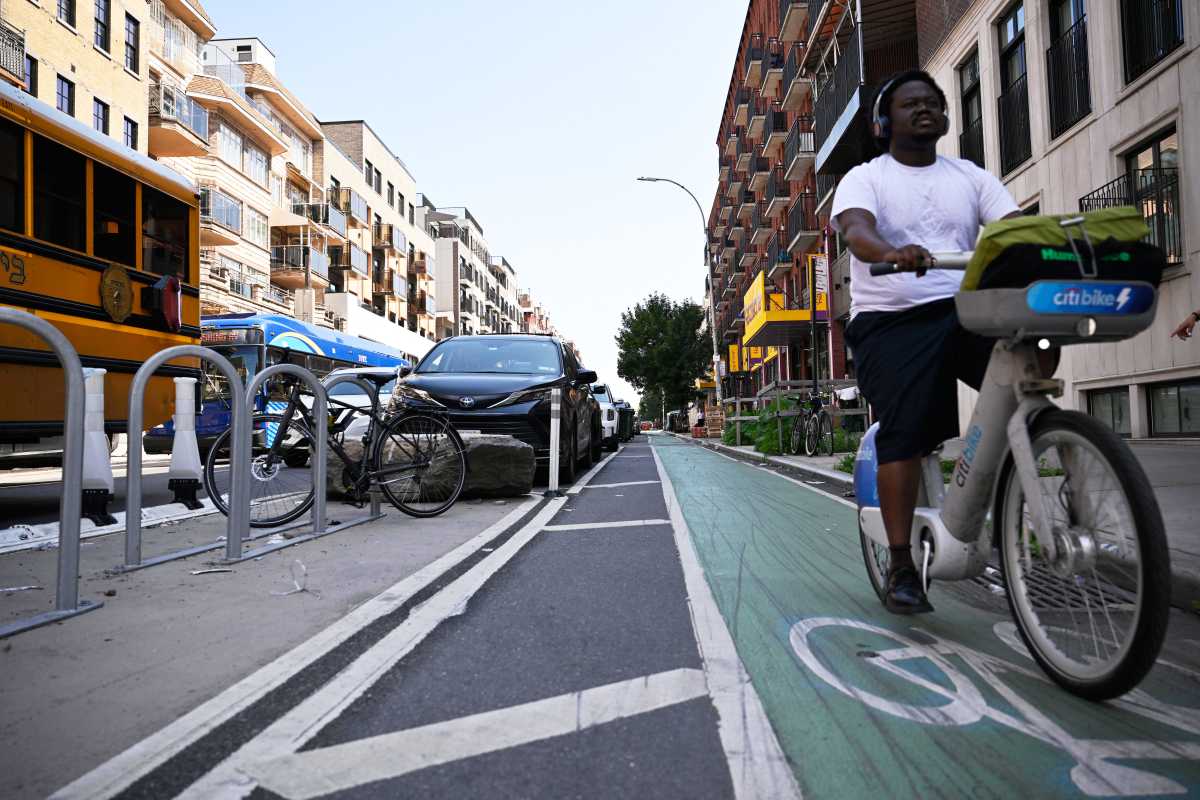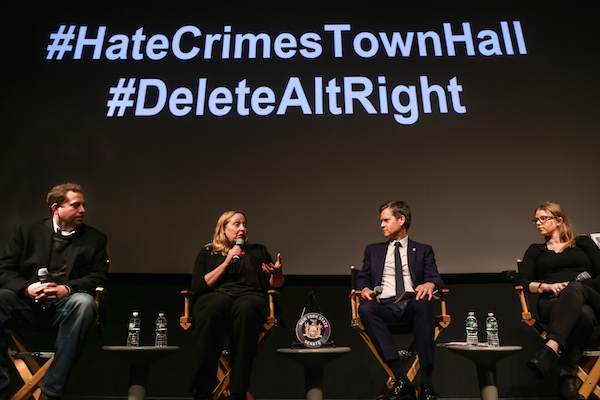
BY LINCOLN ANDERSON | Hate is frighteningly in the air these days. Not surprisingly, it was also on the marquee in big bright blue letters on the SVA Theatre in Chelsea on Sun., Jan. 29. So was Brad Hoylman’s name — but Hoylman is not a hater. Rather, he is trying to help people find some answers to what is fueling — at least in part — the craziness that is currently gripping our country.
More than 300 people turned out to the School of Visual Arts’ W. 23rd St. film screening facility to view a documentary looking at the roots of hate crimes, followed by a panel discussion about the “alt-right” at an event hosted by the state senator.
The name of the film on the marquee was “Hate in America: Stories From the Files of the Southern Poverty Law Center.” Its producer/director, Rebecca Teitel, was on the expert panel, along with Oren Segal, director of the Center on Extremism at the Anti-Defamation League, and Heidi Beirich, director of the Intelligence Project at the Southern Poverty Law Center.
Meanwhile, the name on everyone’s mind was Stephen Bannon, the former editor of Breitbart News — which he has called “the platform for the alt-right.” Over the weekend, new President Donald Trump had elevated Bannon to the National Security Council.
A headline about that shocking story was flashed on the movie screen behind Hoylman as he gave his opening remarks.
“Make no mistake about it,” the state senator said, “a white nationalist with an apocalyptic world vision will be at the table for every national security decision.”
Adding to the climate of fear and uncertainty, just days earlier, Trump had imposed a ban on refugees and people from certain countries seeking entry to the US.
Hoylman noted that he personally has been targeted by haters in the wake of Trump’s election. After he went public with the fact that swastikas had been found carved into a service-elevator door in his Village apartment building, Hoylman found himself bombarded with vicious tweets from alt-righters, he said.
New York Police Department statistics show a 23 percent increase in reported hate crimes throughout the five boroughs in 2016, Hoylman added.
Before the movie started, Hoylman told the crowd that, among other resource materials, he had left a copy of the US Constitution in the theater’s lobby — “which I think you’ll find invaluable over the next four years,” he quipped, to some nervous laughter.
The film follows veteran journalist Tony Harris as he conducts interviews to try to uncover the root causes of several recent heinous hate crimes, ranging from Mississippi to Midtown Manhattan. These include the killing of James Craig Anderson, a 49-year-old gay African-American man, by a group of young whites in Jackson, Mississippi in 2011; the youths singled him out, beat him up and then intentionally ran him over with their truck.
The Southern Poverty Law Center has been tracking hate crimes since 1971, and, according to its data, the LGBT community is the group that is most often targeted by hate crimes. However, in Anderson’s case, it wasn’t clear that he was targeted for his sexuality. He had been slightly inebriated and the whites, who had been drinking earlier at a party, had been cruising for a black victim.
The film also documents the 2012 massacre at the Wisconsin Sikh Temple, in which white nationalist Wade Michael Page killed six people and wounded four before fatally shooting himself. The film notes that Page had lost both his job and girlfriend, and that these things are often triggers for hate violence. Interestingly, Harris interviews a founder of the white nationalist group Page belonged to who has renounced racism and hate. What changed him was that he had a daughter — he had something more constructive and meaningful to put his energies into.
The third incident in the film was closer to home. On May 5, 2013, Nicholas Porto and a friend were walking near Madison Square Garden around 5 p.m. when they were verbally harassed by eight or nine Knicks fans who started calling them “fags.”
When one of the men mocked Porto’s jeans, he responded, “I made them” — after which he promptly found himself thrown to the gutter and punched and kicked in a rapid but brutal beatdown. After Porto spoke out about the incident, he, too, received hate mail. He said he also suffered from post-traumatic stress disorder.
Shortly afterward, Mark Carson, a young gay man, was shot to death in the Village on W. Eighth St., by a man who had been shouting homophobic insults at him.
Hoylman is shown in the film noting that there were nine hate-crime incidents in his district that summer, which some called “The Summer of Hate.”
After the film, Public Advocate Letitia James gave remarks, noting she had been at JFK Airport the day before, where she stood in solidarity with a female Muslim airport worker who had been harassed by a passenger, who told the worker, “Trump is here now,” before kicking her.

“Prejudice and vitriol goes to the top of power now,” James said. “The word has power and consequences, and so do presidential actions. But I tell you: This will not be normalized,” she declared, as the audience applauded.
At the start of the panel discussion — which was moderated by Hoylman — Teitel noted that watching her film today, in light of Trump’s election, “the ending no longer seems pertinent.”
Beirich, of the Southern Poverty Law Center (SPLC; splcenter.org), said that what white nationalist Page and his group wanted to do was “turn back the tide of multiculturalism in the United States. We have an administration that wants to turn the tide back to a lot of what we saw in the film,” she noted.
However, Segal stressed that at the Anti-Defamation League (ADL; adl.org), “I think it’s important to focus on the Trump administration in terms of what they do, not what they say. We focus on what they do because that’s going to give us an ability to respond.”
He also added that not all Trump supporters are members of the alt-right.
On the subject of anti-Semitism and the alt-right, Segal said, “Yes, anti-Semitism is at the heart of the alt-right,” but added, “What extremist movement isn’t anti-Semitic?”
Beirich said that, unfortunately, part of her job is to read Breitbart News.
“It actually has a section on black-on-white crime,” she noted. Bannon, she said, is the “main offender” in the administration right now.
“Trump is welcoming some of the worst elements of our society,” she said. “This is the opposite of the civil rights movement. The country has been working for decades to get rid of this.”
She called Milo Yiannopoulous, a young gay tech editor at Breitbart, “the gateway drug.”
“He tries to create the idea that he’s just kidding,” she said.
“He now has a book deal,” Hoylman interjected, drawing some groans from the audience.
Segal noted that most extremists in the US are “unaffiliated” with specific groups.
“People go online and pull a lot of what they connect with,” he said. “Most people will find hate on their phones walking down the street.”
Added Beirich, “Dylan Roof can go online and never even meet these people,” referring to the Charleston church mass murderer who killed nine people.
Nevertheless, hate groups are on the rise.
“There’s no doubt it’s a backlash to change in demographics,” Beirich said.
“These people do not like the direction of the country — which is away from whiteness.”
Added Segal, “I have never seen so many hate messages reference a presidential campaign.”
“I was trolled after the swastika was found in my building,” Hoylman noted. “It said, ‘Hey Rabbi, what ya doin’?’ ”
Hoylman asked if the message was some sort of code. Segal noted that online trolls’ current “code” for Jews is “skypes,” which is how they avoid automatic filters.
“It will probably change by next week,” he shrugged.
In response to one woman’s question about the alt-right’s hatred of Jews, Segal added that white supremacists think Jews are “not white… and are responsible for race mixing.”
“Well, that would make me proud, as a Jew,” she responded.
Making matters worse, Teitel added that, in the current climate, “It’s really unlikely you’re going to get the Department of Justice investigating hate crimes.”
The panel then fielded audience questions during a Q&A, though some of the questions were more akin to statements.
“We need to be looking at impeachment because he is not competent for the role,” one woman said of Trump. “He showed us who he was for a year. When somebody tells you who they are, and they show you who they are, believe them. In the immediate term, we have to keep this fool from blowing up the world. And for the long term, we have to educate, educate, educate to address and correct this behavior.”
Similarly, Segal said it’s important to educate kids at a young age about differences and tolerance, and that “twinning programs” between big cities and small towns can help in this.
Hoylman asked if the current climate of hate will make more people become racist. Sadly, the answer appeared to be yes.
“It was about Mexicans the first day, then Muslims,” Beirich said. “It normalizes it. The civil rights movement was about de-normalizing it.”Another audience member, Caroline, said, “They’re doing things that absolutely mirror the early days of the Third Reich. When do you have to start calling it what it is?”
“What can we do to get rid of him?” another woman asked, referring to the president.
Hoylman recommended getting more involved locally, such as by joining the community board. He added that congressional midterm elections are also coming up.
“I like the idea of adopting cities,” he said of Segal’s “twinning” concept. “We should also be adopting candidates, as Congressmember Jerry Nadler says.”
The audience appreciated the event, which ran two hours. One senior Chelsea resident, who only gave her name, Jean, said, “I wished it had lasted longer.”
After the informative afternoon, Hoylman told our sister publication, The Villager, “Everybody in the country needs to take stock of what they can do to push back on this attack on our pluralistic society.”
